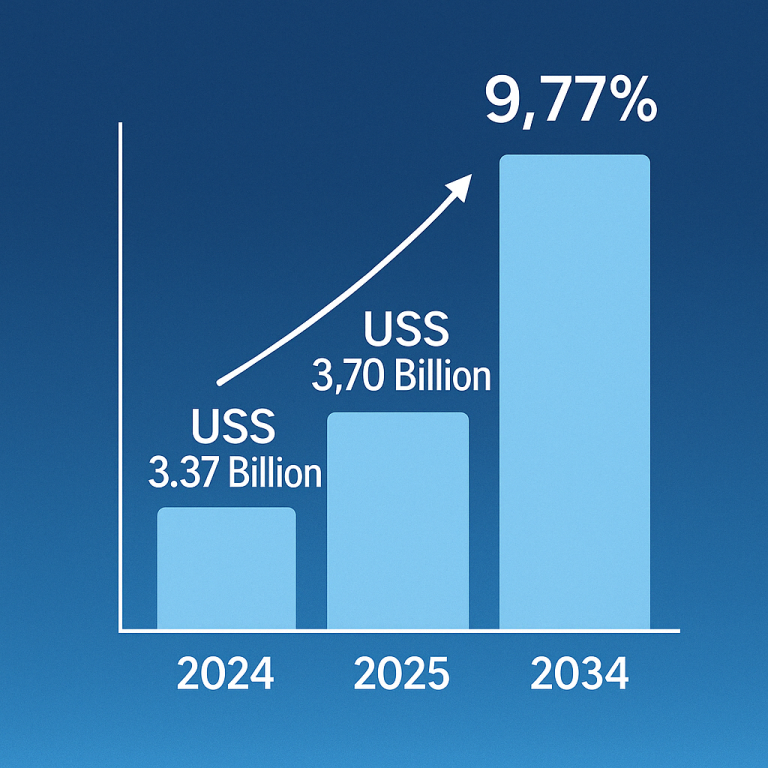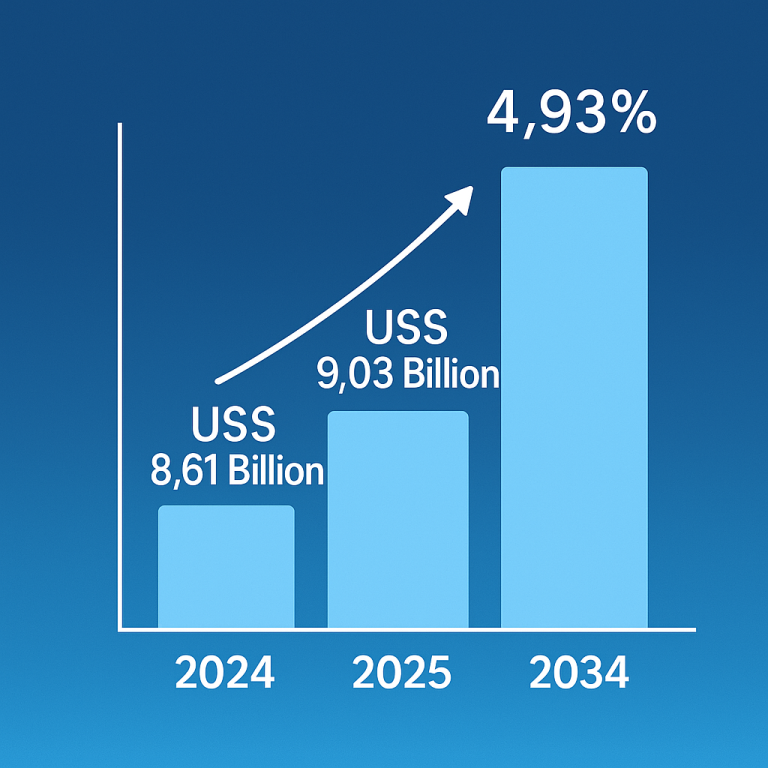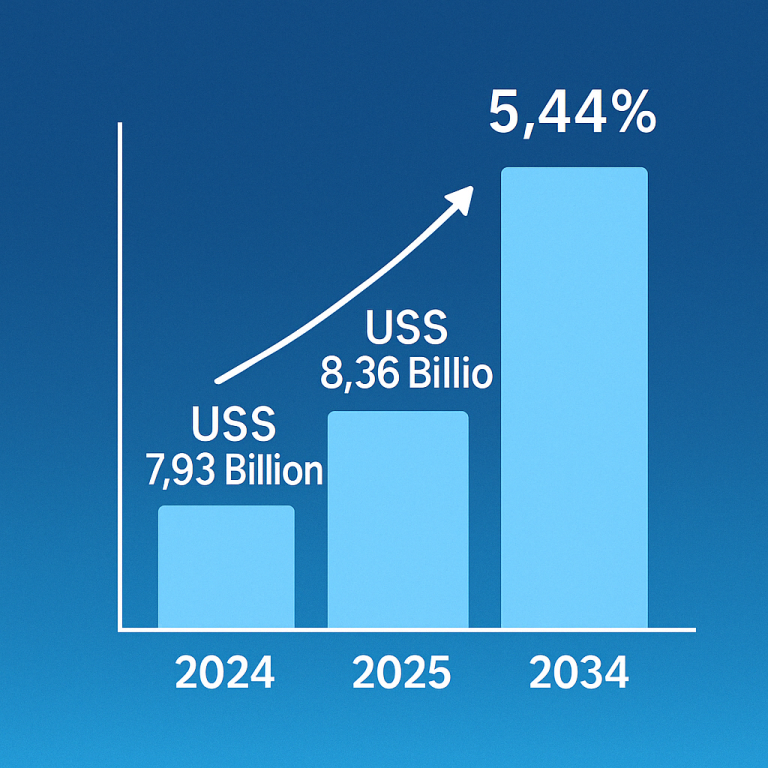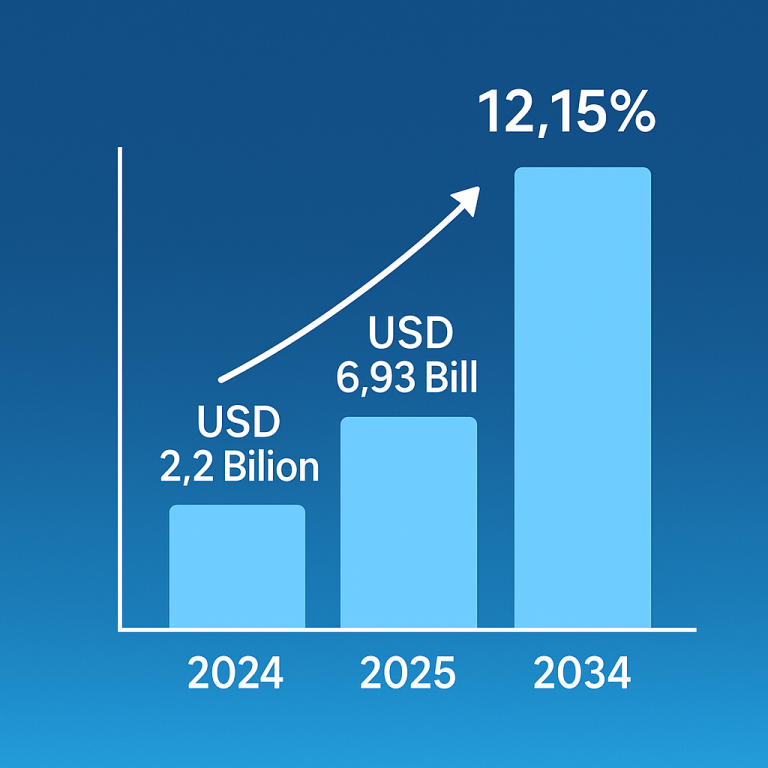In the dynamic landscape of healthcare, the global AI in healthcare market is poised for extraordinary growth, projected to surge from USD 15.1 billion in 2022 to an estimated USD 355.78 billion by 2032. This phenomenal expansion, with a compelling CAGR of 37.66% between 2023 and 2032, is fueled by the escalating adoption of cutting-edge technology, revolutionary innovations in clinical research, and an ever-increasing demand for personalized healthcare.
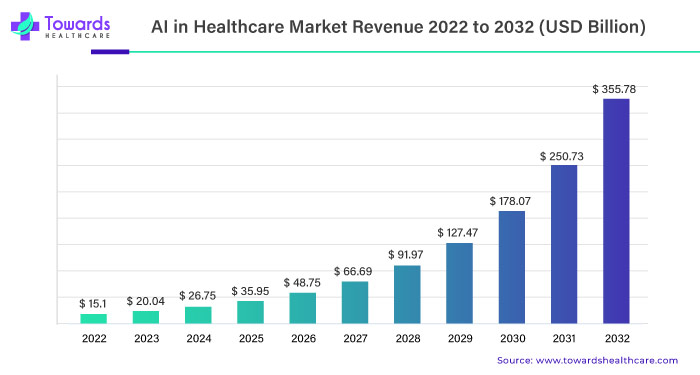
According to a current newsletter article of the National Institute of Health, a remarkable 99% accuracy achieved in evaluating mammograms, leading to quicker Breast cancer diagnosis, has driven market growth in the Healthcare Industry.
Artificial intelligence refers to the ability of a computer system to learn from data and make judgments to increase the likelihood of achieving a goal. The use of AI in Healthcare is growing as more recent technologies are improved and updated. Artificial intelligence (AI) has been applied to several healthcare processes and applications, including virtual assistants, clinical trials, wearables, cybersecurity, administrative workflow assistants, robotic surgery assistance, diagnosis, dosage error reduction, and fraud error detection. Practical and precise healthcare solutions drive the market. As an AI application in Healthcare, it is anticipated to keep growing to demonstrate its worth in raising overall healthcare outcomes, reducing treatment costs, and improving patient care.
Artificial intelligence (AI) emulates human cognitive processes, primarily centred around learning and using analysis to resolve complex problems. This aspect of intelligence involving hardware and software components is often called machine learning. From a software perspective, artificial intelligence (AI) is closely linked to algorithms. Artificial neural networks (ANNs) provide a conceptual framework for implementing these algorithms, mimicking some features of the functioning of the human brain.
The Healthcare field is an up-and-coming area for AI applications. In 2020, researchers developed numerous systems aimed at augmenting clinical decision-making processes. Making systems understand and use information from Machine learning and algorithms in Healthcare is complex. It is a big challenge to create a system that can think both logically and with uncertainty, put medical details in context and code, determine which diagnosis is essential, and suggest the appropriate treatment for the disease. AI in Healthcare is complicated, and ensuring a computer system can handle all these tasks smoothly is challenging.
The development of target therapies and precise medication in cancer, lung diseases, and neurodegenerative diseases is supported by advancements in genomics and proteomics, contributing to growth in early detection. Using this technique can assess the target biomarkers of diseases.
Recently developed AI gadgets in the healthcare market have significantly contributed to the global market expansion in Healthcare.
Top healthcare innovation in 2023:
- Detection of neurodegenerative disease (Parkinson’s disease, Alzheimer’s disease and many others) earlier with Machine learning
- Deactivating the viruses by air curtains
- By using ultrasound and electromagnetic tracking to improve breast cancer treatment
- AI inform Orthopaedic insoles for Diabetics patient
Enhancing the Growth of the Healthcare Industry with Machine Learning and Deep Learning Methodologies
The growing use of digital technology in the healthcare industry is driving up the use of artificial intelligence globally. Better patient care and lower healthcare expenses are two benefits of this technology. This expansion is attributed to several factors, including increased chronic illnesses, an ageing population, and the demand for individualized medications. Healthcare professionals are now integrating AI and machine learning into healthcare systems to improve patient care and diagnose diseases early in neurodegenerative disorders. These AI tools are used by content analytics, natural language processing, data analytics, deep learning, predictive analytics, and care services to support early diagnosis.
The increased processing power of artificial intelligence (AI) systems has fueled recent developments in machines. The increased processing power of AI systems has driven the recent advances in machine learning and deep learning. This development is anticipated to speed up the use of algorithms in Healthcare by reducing processing times. One such is the 2020 release of GE Healthcare’s Suite for Thoracic Care. This novel instrument facilitates the identification of anomalies on chest X-rays associated with COVID-19, including tuberculosis and pneumonia. It speeds up the diagnosis process and helps medical staff and systems guarantee successful treatment.
Additionally, in 2020, Microsoft made a significant investment of $ 20 million in COVID-19 research. This investment focuses on leveraging artificial intelligence technology and data sciences to address critical areas like hospital resources and diagnostics, contributing to the ongoing battle against the pandemic.
In Healthcare, deep learning is crucial in tracing potential cancerous areas in medical images, like X-rays. It’s also applied in “radiomics,” where it detects important features in imaging data that may not be visible to the human eye. This combo of radiomics and deep learning, often seen in cancer-related image analysis, offers more accurate diagnoses than older computer-aided detection tools. CT Imaging is a standard and mainly used method for disease diagnosis, most probably used in cancer to detect which tumour has grown. CBCT scans are collected during treatment and suffer poorer tissue differentiation and resolution than CT scans.
Furthermore, deep learning makes a jump in speech recognition, a type of natural language processing (NLP). Deep learning methods are puzzles – the pieces they use don’t make sense to us, making it challenging to explain the model’s outcome. Deep learning makes a jump in speech recognition, a type of natural language processing (NLP). Deep learning models are like puzzles – the pieces they use don’t make much sense to us. So, explaining why they make certain decisions is tricky because the parts don’t directly translate into something we understand. Even with this complexity, these advancements improve medical diagnostics and language-related tasks.
Large data in the healthcare industry refers to extensive and intricate collections of data collected from various sources, including social media, electronic health records, medical devices (such as sensors and ECGs), billing records, and medical devices. The use of highly developed analytical techniques to make sense of this enormous volume of data has grown significantly during the last ten years. Today’s healthcare practitioners keep digital lab slides, comprehensive radiological imaging, and electronic health records. Big data is produced at various phases of patient care due to the growth of digital systems in the healthcare industry. The healthcare sector is one of the most significant users of substantial data, particularly in the US. AI has significantly changed. It facilitates faster diagnosis and treatment decisions for physicians. Integration has received active encouragement from the government.
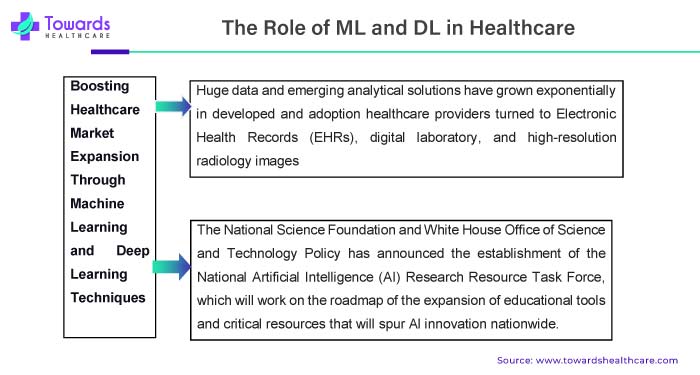
AI’s Impact on Specific Healthcare Domains
In healthcare, deep learning emerges as a game-changer in tracing potential cancerous areas in medical images. Speech recognition, a facet of natural language processing, benefits from deep learning, albeit with inherent complexities. Despite the intricacies, these advancements significantly enhance medical diagnostics and language-related tasks.
Harnessing Big Data for Healthcare Insights
The healthcare industry’s embrace of big data, comprising extensive datasets from diverse sources, is transforming diagnostics and treatment decisions. Advanced analytical techniques make sense of this voluminous data, leading to faster diagnoses and treatment decisions.
Redefining Healthcare Economics: AI’s Role in Cost Reduction
Artificial intelligence’s application in healthcare offers a myriad of benefits, from improved diagnoses to predicting health issues and delivering personalized care. The integration of AI translates into substantial cost savings, estimated at a staggering $150 billion annually, enabling healthcare professionals to focus more on patient treatment.
Harvard’s Endorsement of AI: A Game-Changer in Treatment Costs
Harvard’s School of Public Health advocates for AI in diagnosis, projecting potential savings of up to 50% in treatment costs while concurrently enhancing health outcomes by 40%. This paradigm shift improves clinical operations, quality, and safety in healthcare.
Navigating Challenges: The Roadblocks to AI Adoption in Healthcare
While the promise of AI in healthcare is immense, adoption hurdles loom large. Cost considerations, resistance to change among healthcare providers, and the lack of standardized rules for AI models pose challenges. Additionally, limited data access and integration issues hinder the seamless integration of AI applications in healthcare.
Overcoming Data Access Challenges: Imperative for AI Integration
The optimal utilization of AI in healthcare is contingent upon high-quality data access. The restricted access to comprehensive data within the healthcare sector impedes the efficacy of AI applications. Strategic solutions are imperative to ensure seamless data access and collection, paving the way for advanced AI implementations in healthcare.
Driving Growth: End Users as Catalysts in the AI in Healthcare Market
Pharmaceutical and biotechnology companies leverage AI algorithms for drug discovery, revolutionizing the identification of potential drug targets and expediting the drug development process. The role of end users, including healthcare professionals and organizations, is pivotal in steering the growth of AI in the healthcare market.
AI’s Prowess in Cancer Detection
AI in healthcare significantly aids doctors in accurate diagnoses, reduces errors, and operates 24/7, ensuring continuous service to patients. The application of radiomics, coupled with machine learning, enhances cancer treatment through personalized radiotherapy based on precise analyses of medical images and data.
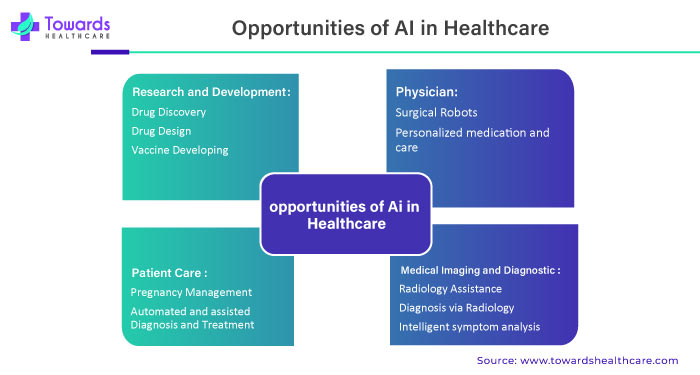
Exploring Opportunities: Geographical Landscape and Recent Developments
The global AI in healthcare market’s trajectory is influenced by geographical trends, with North America leading the way due to its robust healthcare infrastructure. The Asia Pacific is poised for rapid growth, fueled by a burgeoning geriatric population, medical tourism, government initiatives, and increasing demands for high-quality healthcare.
Pioneering Collaborations and Innovations
Recent developments underscore the dynamism of the AI in healthcare market. Collaborations between AI companies and pharmaceutical giants, such as Exscintia’s partnership with nine pharmaceutical companies, showcase the industry’s commitment to advancing drug discovery. IBM Watson’s WFO, an AI tool for oncology, exemplifies the continuous efforts to enhance treatment decisions through comprehensive data analysis.
Competitive Landscape:
Companies are trying to gain a competitive advantage by performing a few crucial measures. They’re putting more into R&D, developing innovative and novel solutions, carrying them to market, working with other technology companies, and offering unique amenities. These strategies help them establish one another and exceed their competition.
Additionally, the market continues to grow due to people being aware and appreciating the growing number of new artificial intelligence (AI) startups. All of this points to the market becoming more dynamic and larger. Google has recently launched a generative Artificial Intelligence Tool for the industry to work with healthcare organizations and professionals. AI vertex Search is a tool used to identify essential and accurate medical information more quickly, allowing users to search through various data sources, including patients’ electronic health records and clinical notes. Medtronic India recently announced a partnership with the artificial intelligence startup Qure.Ai to improve stroke therapy. Through a “hub-and-spoke” network, this partnership aims to incorporate Qure’s artificial intelligence-powered products into primary and comprehensive stroke centres.
Key Market Players:
- Enlitic
- IBM
- Intel
- Lunit
- Microsoft
- Nvidia
- Siemens Healthineers
- Philips
- Johnson and Johnson
- Medtronic
Market Segmentation:
By Component:
- Software
- Hardware
- Service
By Application:
- Virtual Assistant
- Diagnosis
- Robot-assisted Surgery
- Clinical Trial
- Wearables
- Administrative Workflow Assistant
- Cybersecurity
- Dosage Error Reduction
- Fraud Errors Detection
- Connected Machines
- Others
By Technology
- Machine Learning
- Natural Language Processing
- Context-aware Computing
- Computer Vision
By End User
- Hospital and Healthcare Providers
- Patients
- Pharmaceutical and Biotechnology Companies
- Healthcare Payers
By Geography:
- North America
- US
- Canada
- Europe
- UK
- Germany
- France
- Rest of Europe
- Asia-Pacific
- China
- Japan
- India
- South Korea
- Rest of Asia Pacific
- Latin America
- Brazil
- Rest of Latin America
- Middle East and Africa
- UAE
- Saudi Arabia
- South Africa
- Rest of the Middle East and Africa
